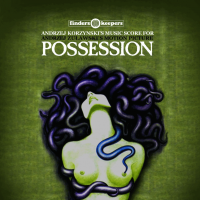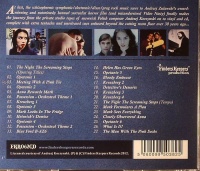Difference between revisions of "Andrzej Korzyński"
m (Text replacement - "==External links==" to "==Links==") |
|||
| Line 98: | Line 98: | ||
</blockquote> | </blockquote> | ||
| − | == | + | ==Links== |
* [http://pl.wikipedia.org/wiki/Andrzej_Korzy%C5%84ski Korzyński at Polish Wikipedia] | * [http://pl.wikipedia.org/wiki/Andrzej_Korzy%C5%84ski Korzyński at Polish Wikipedia] | ||
Revision as of 10:28, 2 June 2015
Andrzej Korzyński is a Polish composer. Born 2 March 1940 in Warsaw.
Korzyński graduated in 1965 from the Fryderyk Chopin University of Music. He studied composition and conducting under Kazimierz Sikorski. Afterwards, together with Mateusz Święcicki and Witold Pograniczny he founded the music studio Rytm which produced several albums. In the late 1960s, Korzyński started composing film music.
Korzyński is the father of screenwriter Mikołaj Korzyński.
Born on March 2, 1940 in Warsaw, the composer Andrzej Korzyński‘s musical career began in earnest when he graduated from the Academy of Social Music in 1964. A student of Professor Kazimierz Sikorski, he studied composition and conducting. Alongside Mateusz Święcicki and Witold Pograniczny, he formed the Radio Studio Rhythm in 1965. His first soundtrack composition was for Andrzej Wajda's 1968 film Everything for Sale. He would work with Wajda on six more films. Korzyński won the Radio Song of the Year three times--in 1965, 1966, and 1974. Along with composing during this period, he also wrote pop songs for the disco parody act Franek Kimono (under the pseudonym Andrew Spoll) with actor Piotr Fronczewski.
His creative partnership with Polish filmmaker Andrzej Żuławski is probably the most enduring and creatively fertile chapter in Korzyński’s career. The duo first worked together on Żuławski’s debut feature The Third Part of the Night, and they would work on two more -- Devil (1972) and The Important Thing Is to Love (1975)--before they would create what would be their defining and best work, 1981’s Possession. Starring Sam Neil and Isabelle Adjani, the film was banned in the United Kingdom under the notorious Video Nasties list, but earned a dedicated cult following in the decades that followed. Korzyński’s minimal electronic score was highly sought after by collectors for many years until 2012, when the Finders Keepers label reissued it along with The Third Part of the Night. The fruitful partnership of Żuławski and Korzyński would be seen and heard again on the films Shaman (1985), On the Silver Globe (1988), and Fidelity (2000). Throughout the 1990s and 2000s, Korzyński continued to work on various TV and film projects.
Works
Possession (1981)

A1 The Night The Screaming Stops (Opening Titles) OGG
A2 Opetanie 1, OGG
A3 Meeting With A Pink Tie, OGG
A4 Opetanie 2, OGG
A5 Anna Rewards Mark, OGG
A6 Possesion - Orchestral Theme 1, OGG
A7 Kreuzberg 1, OGG
A8 Opetanie 3, OGG
A9 Mark Looks In The Fridge, OGG
A10 Heinrick's Demise, OGG
A11 Opetanie 4, OGG
A12 Possession - Orchestral Theme 2, OGG
A13 Blue Ford B-AZ6, OGG
A14 Helen Has Green Eyes, OGG
B1 Opetanie 5, OGG
B2 Bloody Embrace, OGG
B3 Kreuzberg 2, OGG
B4 Detective's Deserts, OGG
B5 Kreuzberg 3, OGG
B6 Kreuzberg 4, OGG
B7 The Night The Screaming Tops (Tempo), OGG
B8 Mark Formulates A Plan, OGG
B9 Mark Sees Everything, OGG
B10 Closely Observered Anna, OGG
B11 Opetanie 6, OGG
B12 What Is It?, OGG
B13 The Man With The Pink Socks, OGG
Label – Finders Keepers Records – FKRMC003, 2012 [1]

